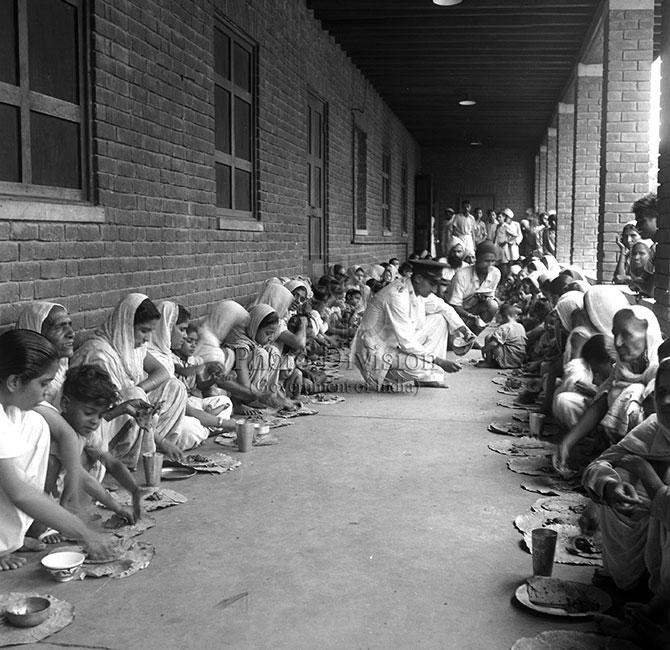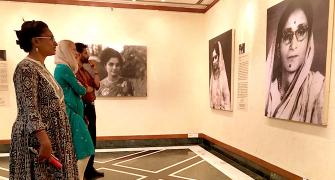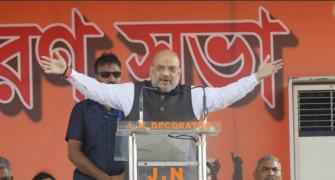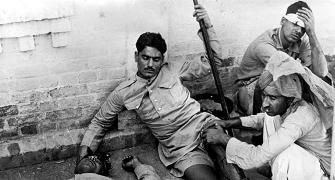Exactly 75 years ago, the Radcliffe Line -- a geographical marker that demarcated the boundary between India and newly-created dominion of Pakistan -- was published, cartographically cleaving the subcontinent barely two days after the country's Independence from British rule.

The line was drawn by British lawyer Sir Cyril Radcliffe, who performed the job during his maiden visit to India, with the Partition further leading to chaos, sectarian violence and large-scale human migrations, unprecedented in modern history, on both sides of the boundary he had drawn, altering the geographical spans and fate of large provinces of Punjab and Bengal that would have far-reaching ramifications.
While West Punjab became part of West Pakistan, East Punjab was given to India, and Bengal's division saw a large swathe of its eastern territory forming part of East Pakistan.
And, it wasn't just a territorial division.
The Partition also led to division of railways, institutions, libraries and as some say, rather poetically, also "division of hearts" given the violence that took place on both sides of India, and both sides of the newly-drawn border.
Horrifying images of trains arriving at border stations laden with bodies of people killed in violence, and a massive number of people marching in foot columns, leaving their home and hearth behind, many starving and struggling on the way to what would become their "new homeland" still send chills down the spine of the death and sufferings that humanity endured.
The human tragedy and mayhem that unfolded was so frightening, it is said, Radcliffe burnt his papers and did not accept the payment for his job, achieved in a little over a month's time.
Poet W H Auden in 1966 wrote a poem titled 'Partition' seen as a criticism of the job, Radcliffe was entrusted with by the British shortly before they granted Independence to India.
"Unbiased at least he was when he arrived on his mission; Having never set eyes on this land he was called to partition. Between two peoples fanatically at odds; With their different diets and incompatible gods," reads the opening line of the poem.
Radcliffe headed the joint commission that was set up to recommend how the Punjab and Bengal regions of the Indian subcontinent were to be divided between India and Muslim-majority Pakistan shortly before India's Independence.
The commission, appointed by Lord Mountbatten, the last viceroy of British India-consisted of four members from the Indian National Congress and four from the Muslim League and was chaired by Radcliffe.
The commission's mandate was to draw boundaries in the two regions based on populations of Hindus and Muslims, among other factors, and sought to keep intact those populations within Indian and Pakistani territory, respectively.
US-based Tarunjit Singh Butalia, whose ancestors belonged to a village that now falls in west Punjab, Pakistan, has heard stories of Partition including those against Sikhs from his elders since childhood.
"Violence happened before and after the Partition, and it broke homes, dreams, hopes. Our ancestral house was set on fire in September 1947 by mobs from a neighbouring village. But, some local Muslims saved the house and lives of our family members. But, seeing the situation worsening, my grandparents and other family members left for India. I have heard those stories many times. My mother was born in Lahore and she also recalls her childhood days there. Partition cleaved the land, but we need to erase the 'border' made in our hearts first, hatred won't take us anywhere," he told PTI from Ohio.
Singh, who teaches at Ohio State University, said a webinar is being hosted Wednesday to mark the occasion. The event is being hosted by Punjab Heritage group in collaboration with Jeevay Sanjha Punjab, he said.
"I was born in 1965 in Chandigarh, when my dad was in the army, fighting against Pakistan... On 75 years of the Radcliffe Line, I have written a poem in Punjabi, as the sun rose today in 'Charda Panjab' (east Punjab) and will set in 'Lehnda Panjab' (west Punjab) on the 75th anniversary of the day our homeland was partitioned on August 17," he said.
A thematic exhibition titled - Partition Horrors Remembrance Day August 14 -- was hosted recently in various locations in Delhi to recall the sufferings of people and pay tribute to them, by the Indira Gandhi Centre for the Arts, which comes under the purview of the Ministry of Culture.
"About 6 million non-Muslims moved out of what had become West Pakistan and another 6.5 million Muslims moved out from the Indian part of Punjab, Delhi, etc., into West Pakistan. In the east, an estimated 2 million non-Muslims moved out of East Bengal (Pakistan) and later in 1950 another 2 million non-Muslims moved into West (India) Bengal. It is estimated that about one million Muslims had moved moved out of West Bengal," read a poster from the exhibition.









